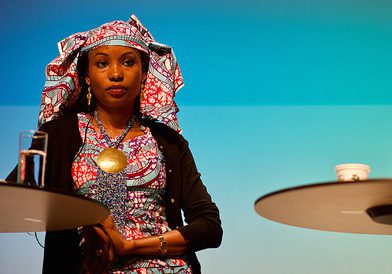BONN, Germany (Landscape News) – Indigenous people must be treated with greater respect, participate fully in discussions about landscapes and receive more funding, said Hindou Oumarou Ibrahim, coordinator of the Association of Indigenous Women and People of Chad (AFPAT), at the Global Landscapes Forum in Bonn, Germany.
An indigenous woman from the Chadian Mbororo pastoralist community, Ibrahim works at the international, national and community level. Her expertise has led to extensive work on biodiversity, climate change and desertification.
There are more than 400 million indigenous people worldwide, she said.
“We’re keeping most of the biodiversity and we’re around all the landscapes – deserts, forests, mountains, we’re in all the oceans, so we know well our environment because our lives and civilization depend on it,” Ibrahim said.
“We have this heritage, but we don’t have the direct access to funding,” she added.
She has worked collaboratively with the U.N.’s cultural agency UNESCO and the Indigenous Peoples of Africa Coordinating Committee (IPACC) on a project that led to 3-D mapping of Chad’s Sahel desert region, where some 250,000 Mbororos survive on herding and subsistence farming.
The project documents the landscape in the context of climate change to create effective environmental and cultural adaptation and development plans.
“We developed 3-D mapping as tools to manage the environment sustainably and give voice to indigenous peoples and local communities,” she said. “This project helps to highlight women’s voices and knowledge on climate adaptation and mitigation. It also helps to solve conflict connected to resource use, as tensions increase when resources disappear.”
Action must be taken at the local, national and international levels, to make a real difference, she said
“All the indigenous peoples’ knowledge are based on land and natural resources: water, wind, clouds, trees, air, birds, and animals,” Ibrahim told National Geographic, which named her a 2017 Emerging Explorer.
“In my community we have six seasons,” she said. “We have a dry season, a rain season and a cold season. But we have a transitional season between those three. We also have certain kinds of trees and we record when they give fruit and in which month.”
The information gathered through mapping aids in documenting the effects of climate change on the seasons, weather and the impact on flora and fauna.
The project also arms Ibrahim to advocate for the Mbororo community on the global stage.
Watch session:
Source link : https://thinklandscape.globallandscapesforum.org/25828/hindou-oumarou-ibrahim-urges-more-rights-for-indigenous-people-to-benefit-landscapes/
Author :
Publish date : 2023-12-01 12:01:53
Copyright for syndicated content belongs to the linked Source.
